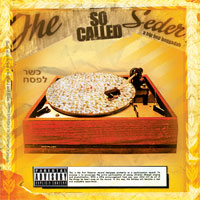
The So Called Jewish Cultural Revolution
Reviewed:
So Called, The So Called Seder
JDub Records, 2005
Scene 1: Somewhere in the maze-like bowels of the massive Jewish federation office building in New York City. I’m sitting in a three-walled cubicle that is home to JDub Records – a non-profit Jewish record and event production company. I am with JDub recording artist Josh Dolgin, - also known as So Called: the Yiddish-rapping, accordion-wielding, Klezmer hip hop maestro. I have half an hour of his time, and an under-prepared list of interview questions.
Several minutes into the interview, we are interrupted by a 30-something federation employee, who appears around a corner wearing his compulsory shirt and tie.
Random Employee: "Hey man, I’ve seen you play!"
So Called: "Come on now…"
RE: "I did! A couple of months ago in Brooklyn – you play the accordion, right?"
SC: "I’m that guy."
RE: "Oh dude, you were great." Reflective pause. Except for the "Baruch atah adonai, mother f—ker." You wrote that, right? That wasn’t so beautiful."
The employee babbles on as Josh reveals to me that he wrote that "blessed" line in tenth grade – one of his first raps. Suddenly a light comes into the interview-crasher’s eye:
RE: Do you know where you are dude? Do you understand what building you’re in?
SC: sort of…
RE: It’s like a crazy Jewish conspiracy…
Scene 2: The Lower East Side’s Slipper Room, home of JDub Record’s monthly party series, Slivovitz and Soul, which was created for – and features – So Called. The room is crowded with Jewish-hipster hybrids, a group of Hasids clustered near the bar, and one or two confused-looking blond girls in stilettos. The bartender hands out free shots of Slivovitz plum brandy, and a back table holds copies of So Called’s long-awaited album, The So Called Seder: A Hip-Hop Haggadah.
So Called is busy on stage rocking the party – his voice rippling over Yiddish melodies, punctuated by a few solid horn players and anchored by his accordion playing and funky beats. A group of the less-inhibited hipsters dance a clumsy and spirited hora. A couple of boys with Jew-fros watch in smiling (almost) disbelief at the unexpected harmony of Yiddish and hip hop. Their friends groove near the stage – eyes closed, sweating.
Around 11:45pm I am approached by a casual looking guy in dark jeans who I assume wants to exercise his J-date skills.
My bashert: "Pardon me, can I ask you a question?"
Me: "hmmm? Oh, sure."
MB: "Well, actually a couple of questions. I’m doing a study on the people who come to events like this."
Me: "I would love to – wait. You’re what?
MB: Yeah, I have this grant from the National Foundation of Jewish Culture to research the types of people who are attracted to shows like this.
Me: Excuse me, I have to go to the bathroom.
What do these two scenes have in common? For one, they highlight So Called’s growing reputation as an artist who has tapped into Jewish music’s inner funkaliciousness. They also indicate that Jews – especially those in the 20-35 crowd – totally dig the funk. So Called’s fans seem equally pleased by the explicit "Jewishness" of his music as they are by his fresh beats. There is little doubt that if So Called had said to the Slivovitz audience "when I say cool, you say Jew," there would be an enthusiastic chorus of: Cool! Jew! Cool! Jew!
Perhaps the oddest thing that ties the scenes together, however, is not So Called or grooving Jews, but the presence of the mainstream Jewish funding in So Called’s decidedly fringe scene.
Throughout the last half-decade, the Jewish federation system and some of the mega-philanthropists (think or even google UJA Federation, United Jewish Communities, Bronfman, Steinardt, Schusterman…) started to invest increasing amounts of energy and money into the cultivation of Jewish culture. More specifically, they have invested the money into the cultivation of Jews, using culture as the fertilizer. They know that many contemporary young Jews do not find Judaism to be relevant to their lives, interests, or identities. They are frustrated by the pandemic of Jews who have distanced themselves from anything Jewish, and if culture works, they're for it.
At the same time, the last half-decade has given way to a number of Jewish artists like So Called and Matisyahu (JDub’s other musical sensation), as well as a growing cadre of innovative Jewish organizations, publications, websites, blogs, funding networks, and companies. These organizations – like Heeb magazine, the Jewish-environmental organization Hazon (for which I work), the ritual theatre company Storahtelling, and Zeek (for which I also work) - are breathing the spirit of contemporary life into Judaism and the ruach of Judaism into contemporary life. (Of course, not all the "new Jewish organizations" are equally hip and Jewishly substantive – some enterprises are more one than the other). The mainline federations and philanthropists cannot help but notice that artists like So Called get their little Rachels and Noahs – who formerly renounced their Hebrew school upbringing - dancing to a Jewish beat. Not a beat these philanthropists understand really, but a Jewish one, or at least one accompanied by Yiddish. The majority of Jewish money is still directed towards conventionally Jewish issues like Israel and formal Jewish education. But the shift in federation thinking (and giving) towards things "young, innovative and Jewish" is beginning to peek through the cracks of establishment.



Star Wars, George Bush, Judaism, and the Penis
Jay Michaelson
The So-Called Jewish Cultural Revolution
Leah Koenig
Witnessing Marshall Meyer
Josh Feigelson
We Will Destroy the Museums
Dan Friedman on Ashes and Snow
Clive Firestone
Nicole Taylor
Heart of Pinkness
Michael Kuratin
Archive
Our 670 Back Pages
Zeek in Print
Spring 2005 issue now on sale!
About Zeek
Mailing List
Contact Us
Subscribe
Tech Support
Links
From previous issues:
Art at War
Bara Sapir
Whatever It Takes
Aaron Hamburger
What, me Tremble?
Jonathan Vatner